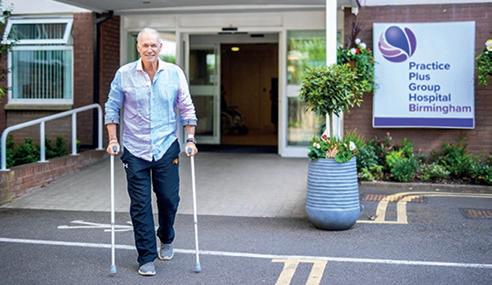
2 minute read
Tax revolution ahead for the self employed and property owners
by Andy Fuller, Outsourced Business Services director, McBrides Accountants
Over the next three years, a revolution is coming for self employed people and property owners in the way they report their taxable income.
Making Tax Digital for Income Tax (MTD for IT) will mandate most people who make their own income outside of PAYE (except for partnerships, trusts and estates) to embrace cloud accounting and say goodbye to paper receipts forever.
This is the biggest change we’ve seen in decades. It’s not just a case of ensuring that all your accounting records are maintained digitally, there’s a significant change in habit from April next year as people will need to make quarterly returns to HMRC rather than a single return once a year.
Who will it affect?
The income threshold (initially £50,000 gross) is applied to the following income types:
• Self Employment (excluding partnership income)
• UK property
• Foreign property.
The changes will also apply to smaller businesses and property owners in the coming three years as the threshold drops in 2027 and 2028, pulling in people earning £30,000 gross (i.e. ignoring costs) from April 2027, and £20,000 gross in April 2028.

What can you do?
The first step is to understand whether you are within the mandated change, and which stage in the next three years it’s likely to impact you.
If your 2024/2025 tax return includes combined income over £50,000 from the income types above, then change is imminent, and you’ll need to start maintaining your records digitally from April 2026 with the first submission required by early August.
It’s important to understand where you are on the journey of making your accounts digitally savvy, so that you can plan now and act accordingly.
Secondly, it’s time to tidy up your financial records. Do you have a separate bank account for your business? If not, then it's essential to set one up now, because you won't want to separate out your business transactions from personal ones each quarter.
If you own property and run a business, you should hold a separate property account. The good news is that you can include multiple properties in this account.
Which cloud accounting software?
Lastly, before moving to the new reporting process, you’ll need to explore software options and find the right one for you, so it’s a good idea to consult your accountant before deciding.
Good software options include Xero, which offers comprehensive accounting and reporting, and the smaller Dext, which holds receipts digitally for you.
Benefits
There are other streamlining bonuses too.
If you’ve been running a sole trader business and keeping manual records, chances are you have those records somewhere. From April 2026, you won’t need to keep receipts after you’ve scanned them. Cloud accounting is also all about efficiency and timesaving, so you’ll benefit from spending less time on accounting.
MTD in its current guise only covers individuals so LLP structures and partnerships, trusts and estates won’t have to act now. However, digitising receipts is an effective accounting practice and one we’d urge most people to embrace, regardless of whether they are being asked to ‘Make Tax Digital’ next April.
If you are digitally excluded or there are reasons why you can’t make the move to cloud accounting, then HMRC is currently allowing applications for exemptions.
Do speak to your accountant about this, sooner rather than later, if you’re worried that it’s not reasonable for you to use compatible software to keep digital records.
Overall, MTD for IT is a positive change for most people and provides opportunities. Embracing this mandated change can be to your advantage. With the change coming in April 2026, speak to your accountant to help you plan ahead.
Please contact Andy Fuller if you would like help with your transition to Making Tax Digital. You can reach him on 020 8309 0011 or andrew.fuller@mcbridesllp.com.







